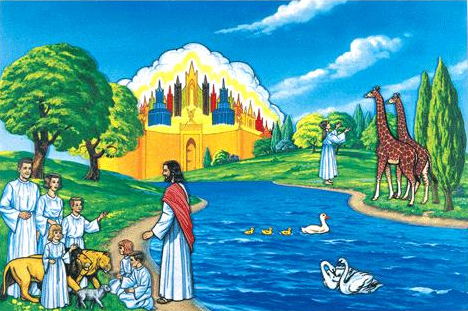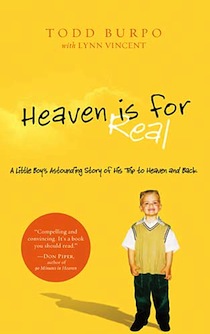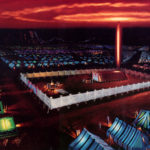No More
 Resurrection Sunday is this Sunday. I don’t expect it to be the only Resurrection celebration on our calendars for too long, eternally reckoning. After all, after the future Resurrection Day when Christ returns and raises His people to life, clothing them in a redeemed Spirit-empowered body rather than a sin-wracked body (1 Cor. 15), how would we celebrate such a day forever if not under the name Resurrection Day? I suspect we might keep the original Resurrection Sunday to refer to Christ’s original, once-for-all resurrection victory.
Resurrection Sunday is this Sunday. I don’t expect it to be the only Resurrection celebration on our calendars for too long, eternally reckoning. After all, after the future Resurrection Day when Christ returns and raises His people to life, clothing them in a redeemed Spirit-empowered body rather than a sin-wracked body (1 Cor. 15), how would we celebrate such a day forever if not under the name Resurrection Day? I suspect we might keep the original Resurrection Sunday to refer to Christ’s original, once-for-all resurrection victory.
Either way, I can’t wait. I can’t wait for Resurrection Day, can’t wait for New Earth, can’t wait to have work/play be only rewarding and joyous forever, can’t wait to be free of sin and its consequences — can’t wait to see my Savior and live with Kingdom family forever.
You may notice I did not say, “I can’t wait for Heaven.” This isn’t because I take lightly the current Heaven, a literal location, likely outside our own dimension, to which all Christ’s people go when they die. Yet I think of the present-day Heaven like I think of the rest stops when my wife and I moved to Texas last fall. Those restaurants, stores and the hotel were welcome, but they were not our final destination; they were only waypoints. Our new home — that was the best part.
This kind of hope is sadly missed by movies such as Heaven Is For Real1 and other books, sermons, and anecdotes that focus on the present-day Heaven2 — as if that Heaven is where God’s people will live forever.
If you came for a Heaven Is For Real rebuttal, I am afraid I must disappoint and direct you to the excellent reviews by Randy Alcorn or Tim Challies, or this reminder by Wade Bearden at Christ and Pop Culture. This Resurrection Sunday I have no (further) criticisms of books that try to project Heaven’s wonders based on the word of people who say they won the golden ticket and a grand tour. Instead I feel mostly regret that these materials focus so much on the present-day heaven that will pass away just like the first Earth (Rev. 21:1). I regret that the kind of eternal hope they offer can become as fleeting as cheap utopianism — the kind that embraces this sinful age and promises we can build a kingdom our way.
Against either set of errors I want to cry: No more. Into hopelessness about life or stray notions about a tedious forever, I want to cry: No more. For those who may doubt the promises of Christ, who grieve over this groaning world and the sin and suffering in their lives, and who may have missed the wonder and magic of whatever God has promised for the final-and-forever After-world … Scripture itself in Revelation 21 vows: No more.
No more first heaven or first earth (verses 1–3)

The classic Betty Lukens Sunday-school flannelboard lesson is actually quite close to the truth — right up to and including the giraffes.
What Jesus did spiritually now becomes physical. God replaces the first heaven and first earth, now “passed away,” with their resurrected replacements. Yes, this groaning world (Rom. 8) passes away, but so does the first Heaven. Where then will God live? Where will we live? Heaven is where He lived and where the saints lived — now the Creator is the first to relocate His home to Earth (verse 2). “Now the dwelling of God is with man” (verse 3).
No more tears (verse 4)
Have you ever cried from an emotion that wasn’t grief? I have no doubt those tears will still be “allowed.” We may gaze into the face of Jesus and weep with joy. But the other tears, the kind that come from God-created tear ducts only during a sinful age, will be wiped away. Can you imagine no more weeping over separation, depression, pain, fatigue, hopelessness, anger over wickedness in yourself or others, or as any other response to sin and suffering?
No more death (verse 4)
Personified Death itself was hurled into Hell a few verses ago (Rev. 20:14). God’s people are beyond all that. What God fixed spiritually in Christ’s resurrection He now fixes physically and completely in our resurrection. His people are eternal. Imagine being set free not only from the spiritual concept of physical death but the threat of real death in everyday life.
No more mourning, crying, or pain (verse 4)
And imagine being set free from death’s consequences. No longer do we need to mourn over God’s people, dear spiritual and physical family members who had died; now they are here with us. Crying has expired. Pain has passed away. And after death itself dies, what in the world would this do to human culture? Entire mourning/crying/pain industries have also passed away. Doctors, nurses, funeral workers, morticians — all can joyously give up the tools they used to ease or bring closure to suffering (included insurance paperwork!) and pursue other callings. Lawyers? Gone, or they will find their professions transformed. Emergency workers? Their ministries are fulfilled. How will they use those skills in the Kingdom? We have all worked in the mourning-mitigation business — how would we?
No more thirst (verses 5–6)
Seated on the throne, God Himself, the Alpha and Omega who speaks only truth, promises for certain: those truly thirsty will receive “the spring of the water of life without payment.”
No more delayed victory; no more separation from God (verse 7)
Members of the Kingdom, all conquerors in Christ, “will have this heritage.” This is as close as you can get to hearing God Himself specifically say, “You have a part in this great Story. I promise you will forever know where you belong. In My Son you share in this victory.”
Moreover, as players in the Story our adoption is complete: we all function as sons of God. This isn’t gender-exclusive language — it’s inclusive. The Father himself says that anyone who conquers becomes an adopted son. Daughters are treated as sons, with all the rank and privilege that comes with that role as perceived by the first-century world. That’s huge.
No more cowards, faithlessness, detestable acts, murder, fornication, sorcery, idolaters, lies, and any other sin (verse 8)
This verse is often included in evangelistic pleas, and it should be. Even a boring-sounding Heaven would be better than a lake of eternal burning fire (a reality that is surely worse than Scripture’s already-horrifying descriptions would indicate). But New Earth is the most incredible, perfect, magical, wondrous place that could ever be conceived, ruled over by the most interesting and infinite Being beyond imagination. That makes the horror even worse.
Yet apart from that sobering truth, this text includes such hope for Christians. Perish all prideful notions that this is a guarantee text that Those People won’t be allowed in the Kingdom. In fact those people will be there — us. When we are beyond all those sins and love Jesus more, we ourselves will never again deal with cowardice, fear, sexual temptation, manipulative impulses (which lead to sorcery), idolatry, lies, or any other sin. All that has passed away. Our whole selves are made new. No more sinful self. Only Jesus Christ. Only His perfect, remade, purified, fantastic world set free: Resurrection Sunday, all over again.










































An interesting point of view, and one that is glossed over by a lot of people. As for me, I honestly don’t bother wracking my brain about the specifics of the New Heaven, New Earth, Second Coming, etc. I long as I know its going to happen, and we’ll be in a glorious relationship with God forever, I don’t need to know the details. I’ll just enjoy it when it happens.
I doubt we’ll be disappointed, whatever God has in mind.
Well said, Stephen. I agree wholeheartedly.
Thanks, brother!
Though I actually think there is a stronger biblical case to be made that we never actually go to heaven (instead residing in Paradise until the resurrection), I agree with the gist of this excellent post. We put far too much emphasis on the waiting place and not enough on the destination. The Reunion and Renewal are the things that keep me going in the darkest hours.
Well said, indeed.
Good words.
I can’t maintain the confidence or the assurance to be an honestly practicing evangelical believer, but the Resurrection is one theological teaching that I cherish and that I feel confident in. Resurrection — the New Earth — is almost the only theological concept that is real to me.
Salvation as an on-off state of existence doesn’t seem real to me. The Holy Spirit doesn’t. Worship rarely does. Sometimes I doubt those things. But I have only doubt the resurrection during my very darkest moments. Sin is obviously real; everything is obviously wrong. For wrongness to exist, rightness must also exist. God is Justice, and every wrong must be made right. All things must be born again.
I think that belief in the New Heavens and the New Earth really has been the only thing preventing me from losing my faith and from falling into suicidal despair, at a few points during the past few years. And I first heard about this doctrine here on Speculative Faith.
[Cue sappy “only God could do this….”, “…such a blessing”, “…not a coincidence” phrases.]